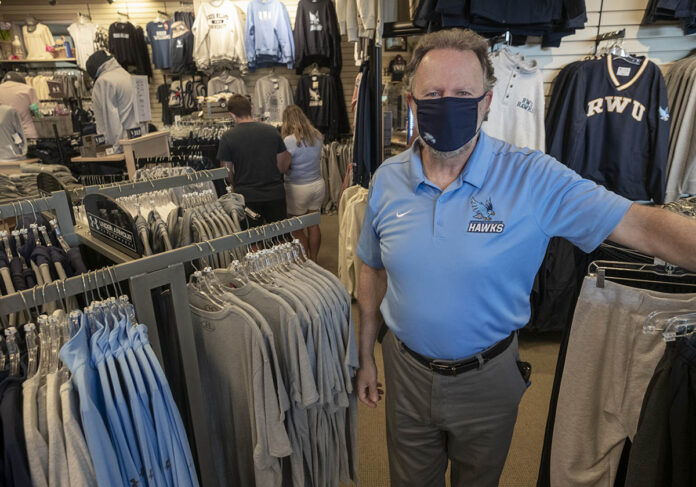The universities in Rhode Island that are trying to reopen residence halls and classrooms this month are requiring everyone on campus to wear face masks when indoors, or in common areas where people come together.
Will it work? Time will tell.
Several large state universities and prominent colleges elsewhere in the country have tried the same thing, only to throw in the towel on in-person instruction.
The University of North Carolina closed about a week after reopening, telling most students in its residence halls to go home.
Michigan State University scrapped all on-site classes about a week before it reopened. “It has become evident to me that, despite our best efforts and strong planning, it is unlikely we can prevent widespread transmission of COVID-19 between students if our undergraduates return to campus,” said Dr. Samuel L. Stanley, school president, in announcing the move.
What makes Rhode Island universities different? State health officials say the local rate of infection matters. Rhode Island has had increasing cases since a low point in June, but the state remains below the per-capita rates seen across the Midwest, South and West.
The culture of wearing masks also is strong in the Northeast, and it will be critically important in keeping the universities open for in-person learning, according to administrators and public health officials.
The state’s recommendation for every institution, from the Naval War College to the Community College of Rhode Island, was for all students to wear a mask at all times when they’re outside their dorm rooms, or in a public place, said Dr. James McDonald, the medical director for the R.I. Department of Health.
“Rhode Island colleges are requiring masks of their students, and they have a lot at stake,” McDonald said. “When you read about the University of North Carolina opening and closing, what you see is that colleges don’t want to do that.”
Some Rhode Island universities are opting for all or nearly full online instruction. Rhode Island College and Johnson & Wales University, for example, have already said that most classes will be held remotely.
Other universities are offering a choice between online and in-person classes and are allowing students to move into the residence halls or on-campus housing, although in reduced numbers.
The colleges were required to submit their reopening plans to the state, McDonald said. The Department of Health is holding regular weekly conversations with all the universities. Any incidents of infection must be reported. If universities have clusters of infection, whether on campus or off campus, the state will work with the schools on a response, he said.
“We will work with each school as they have cases,” McDonald said. “It is highly likely every college will have a case, and cases, and we’ll help them decide what is the strategy that makes the most sense. Do you close down a classroom?
“Closing a college is a very big deal,” he said. “That is a complicated decision that we would help the college work through.”
All of the universities submitted quarantine plans as part of their reopening plans. Some are exhaustive.
Bryant University, one of the universities that is opening for in-class instruction, submitted a 300-page control plan, McDonald said.
If the universities can encourage students to wear masks as part of a social compact, that it’s the right thing to do, McDonald said he thinks they can stay open.
At Roger Williams University in Bristol, which started moving in students in late August, about three-quarters of the student body lives on campus, said John King, vice president of student life.
The challenge that universities will face with mask policies, he said, is gaining the “total buy-in necessary to preserve the integrity of the mask policy.”
“The larger the campus is, and the broader their footprint is off campus in terms of campus housing – some universities have more students living off campus than they do on campus, the more challenging it becomes to just accept it as a culture.”
Because so many of Roger Williams University students live on the campus, King said it’s easier to enforce that cultural shift.
Part of that is through the network of resident assistants, who are assigned to the living halls. Part of that is expectations set by teachers and students.
Roger Williams will have traditional, two-student roommate assignments to each dorm room. But while they won’t have to wear a mask inside their rooms, students are expected to wear them in hallways, in common bathrooms, in the dining hall and other areas.
Guests are going to be limited in number at each room, and visits from family or off-campus friends will be restricted as well.
“We have 90 resident assistants across our system,” King said. “But honestly, the No. 1 way of enforcing it is going to be through the honor code and through students protecting each other and living through that.”
That enforcement of the mask policy will begin as a conversation and can lead up to a student conduct code action. The university is going to track complaints regarding students and masks, King said.
The students and faculty will be tested frequently, even when no symptoms are apparent. The university has contracted with The Broad Institute, of Cambridge, Mass., for the testing service. The turnaround will be about 20 hours.
The effort to reopen hinges on people doing the right thing. Students, for their own mental health, want and need to be back on campus, King said.
“From a developmental perspective, the isolation related to COVID has had some real negative impact on their own mental health and their feelings of connection,” he said. “That’s what’s driving them to be back. They’re looking for some sense of normalcy, even though everything can’t be as it was when they left.”
Mary MacDonald is a PBN staff writer. Contact her at Macdonald@PBN.com.












